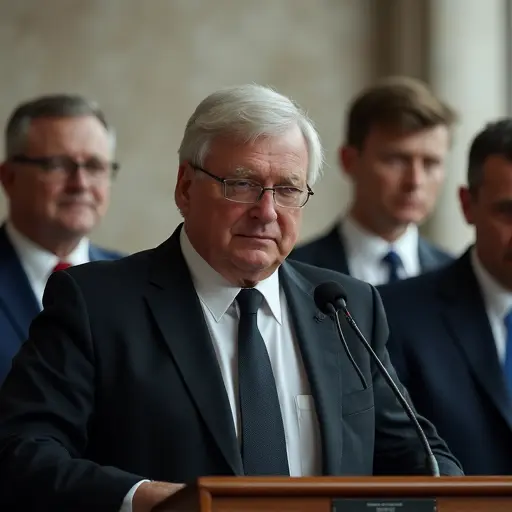German Chancellor Friedrich Merz definitively rules out cooperation with far-right AfD, emphasizing fundamental ideological differences and citing the party's extremist designation by German intelligence.

German Chancellor Merz Draws Clear Line Against Far-Right Cooperation
German Chancellor Friedrich Merz has unequivocally ruled out any political cooperation with the far-right Alternative for Germany (AfD), declaring that his Christian Democratic Union (CDU) will maintain a firm firewall against the extremist party. The announcement came following intensive leadership discussions within the CDU about how to handle the growing electoral threat from the AfD, which has been officially designated as extremist by Germany's domestic intelligence agency.
Fundamental Ideological Differences
Merz emphasized that the differences between his conservative party and the AfD go beyond mere policy disagreements. 'We have nothing in common with this party, I want to emphasize that,' Merz stated during a press conference. 'They say they want to destroy us. That is something I have never heard from any other party. Anyone who says something like that must know that they will face the most determined resistance. We will not allow these people to destroy us.'
The chancellor's firm stance follows a controversial debate within CDU ranks, where three former party leaders had suggested that cooperation with the AfD shouldn't be automatically ruled out given the party's growing electoral strength. However, Merz made it clear that such considerations have been definitively rejected.
Security Agency Designation
The political context for Merz's declaration is significant. In May 2025, Germany's Federal Office for the Protection of the Constitution (BfV) officially designated the entire AfD as a confirmed case of right-wing extremism. This classification, based on a comprehensive 1,100-page report, gives authorities expanded surveillance powers and represents the highest level of scrutiny available under German law.
The intelligence agency cited the AfD's 'ethnicity-and ancestry-based conception of the people' as fundamentally incompatible with Germany's constitutional order. The designation followed years of controversy surrounding the party's nationalist rhetoric and positions on immigration.
Upcoming Electoral Challenges
The timing of Merz's declaration is crucial, with five state elections scheduled for next year. Recent polls show the AfD performing particularly strongly in eastern German states, where they could become the dominant political force. According to recent polling data from PolitPro, the AfD currently stands at 39.8% in Saxony-Anhalt and 38% in Mecklenburg-Vorpommern, making them the strongest party in both states.
This electoral strength has raised concerns about potential government formation challenges, as traditional parties may struggle to assemble coalitions without AfD participation in states where they become the largest party.
Strategic Response
Merz outlined a comprehensive strategy to counter the AfD's influence, emphasizing that the CDU will 'fight the AfD with all political means.' The chancellor indicated that his party plans to more clearly articulate the fundamental differences between conservative democratic values and the AfD's extremist positions.
'The differences between both parties do not concern details, but fundamental questions and fundamental political convictions,' Merz explained. The CDU intends to bring these distinctions more clearly into public focus in the coming months.
The chancellor's position reflects Germany's longstanding political tradition of maintaining a 'firewall' against far-right cooperation, a principle that has been maintained since the post-World War II era. While Merz avoided using the specific term 'firewall,' his statements reinforced the same underlying principle of non-cooperation with extremist parties.
The debate over AfD cooperation comes at a critical moment for German politics, as the country navigates complex challenges including economic pressures, migration issues, and security concerns. Merz's firm stance signals his commitment to maintaining Germany's democratic traditions while addressing the legitimate concerns that have fueled AfD's electoral success.

 Nederlands
Nederlands
 English
English
 Deutsch
Deutsch
 Français
Français
 Español
Español
 Português
Português









